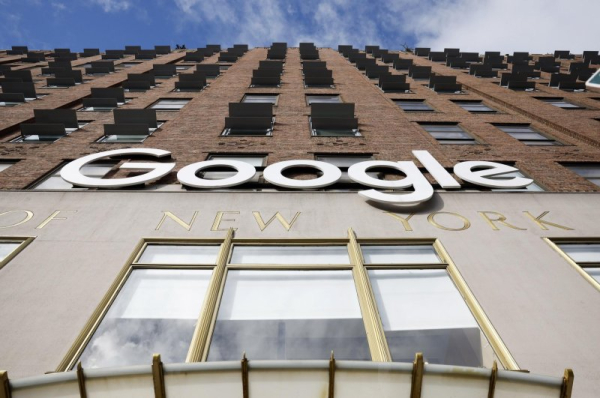

The Google logo pictured Jan. 2023 above the entrance to the Google Building, formerly known as Union Inland Terminal, in New York City. On Thursday, the European Union revealed its investigation into the search giant after monitoring discovered select content by sponsors or advertisers was granted a lower priority by Google Search. File Photo by John Angelillo/UPI | License Photo
The European Union is looking into Google over ongoing concerns that it “demotes” the content of news publishers and other media sites.
On Thursday, the EU’s executive arm revealed the action following monitoring that discovered select content by sponsors or advertisers was granted a lower priority by Google Search and that it was less or no longer visible in search queries.
“We are concerned that Google’s policies do not allow news publishers to be treated in a fair, reasonable and non-discriminatory manner in its search results,” according to Teresa Ribera, the European Commission’s EVP for clean, just and competitive transition policy.
The commission stated it was investigating parent company Alphabet’s supposed demotion of publisher websites and content in Google Search, and if it may “impact publishers’ freedom to conduct legitimate business, innovate, and cooperate with third-party content providers.”
“We will investigate to ensure that news publishers are not losing out on important revenues at a difficult time for the industry, and to ensure Google complies with the Digital Markets Act,” Ribera added in a statement.
Google, meanwhile, called the EU investigation “misguided” and “without merit.”
“Unfortunately, the investigation announced today into our anti-spam efforts is misguided and risks harming millions of European users,” company officials said.
In September, the European Commission fined Google more than $3 billion for violating the EU’s anti-competitive practices in advertising technology, which prompted a threat by U.S. President Donald Trump to impose higher tariffs.
Under Europe’s DMA, which governs tech competition, Google is obligated to apply “fair, reasonable and non-discriminatory conditions of access to publishers’ websites on Google Search.”
The Digital Markets Act “ensures fairer markets and innovation” for EU businesses and consumers, said Henna Virkkunen, the EC’s executive vice president for tech sovereignty, security and democracy.
Ribera said the authority took its action to ensure that “digital gatekeepers do not unfairly restrict businesses that rely on them from promoting their own products and services.”
EC officials said a potential “loss of visibility of revenue” for media operators could stem via Google’s anti-spam policies.
“Alphabet must comply with the obligations to provide publishers fair, reasonable and non-discriminatory general access conditions to Google Search,” said Virkkunen.
Meanwhile, Google officials will ask publishers to submit evidence of website traffic impact and revenue as a result of alleged fair practice violations, the commission says.
“And the investigation is without merit,” the search giant continued. It added that a German court had “already dismissed a similar claim, ruling that our anti-spam policy was valid, reasonable and applied consistently.”
Google claimed its policies were designed to build “trustworthy results” and “fight deceptive pay-for-play tactics” that “degrade” Google’s search results.